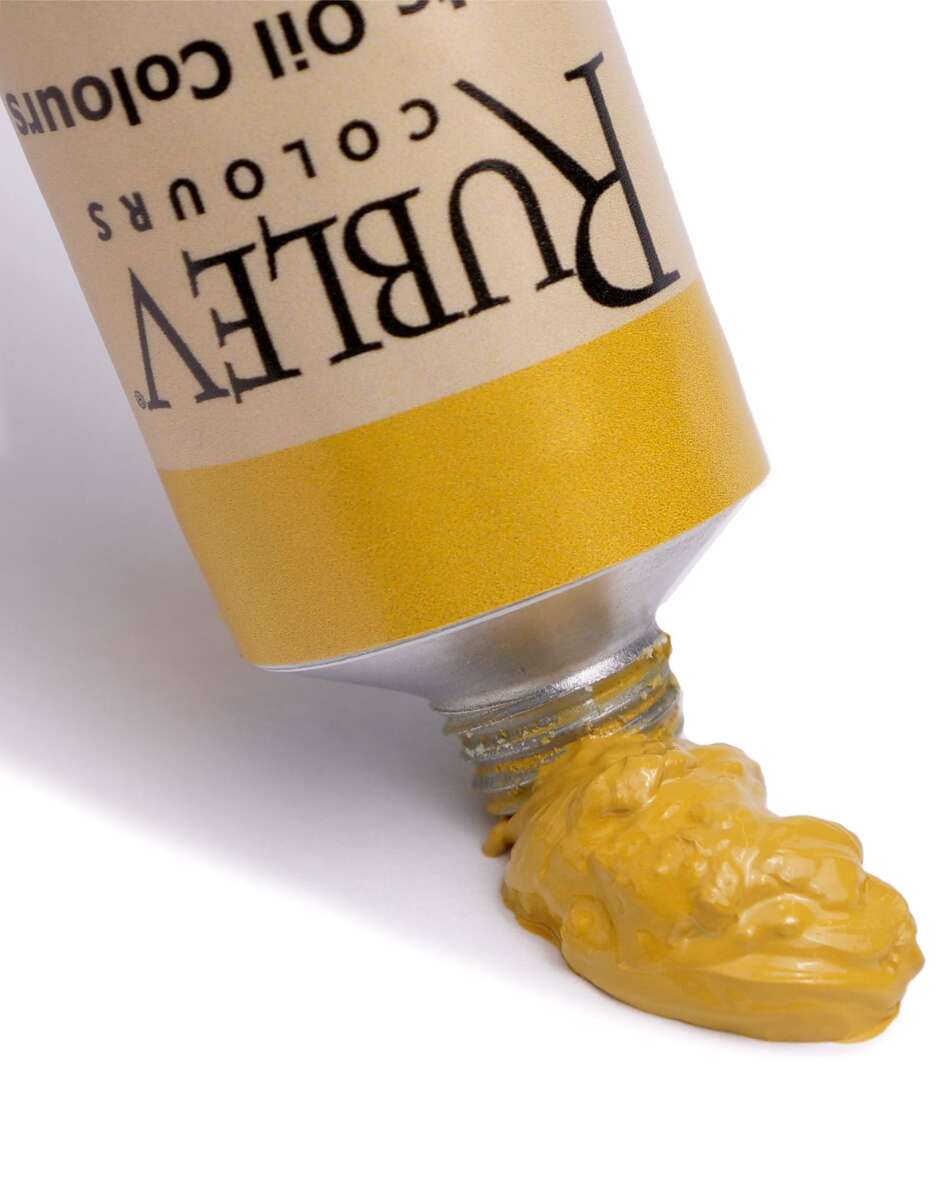Naples Yellow Paris (Lead Antimonate) Oil Paint
IMPORTANT NOTICE
According to the German Chemical Prohibition Ordinance, this item can only be sold to professional users, resellers, or research institutions. Please fill out the Chemical Prohibition Ordinance form and return it to Natural Pigments by email, together with any documents that may be required. We will process your order as soon as we have received the documents.
Download the form here: German Chemical Prohibition Ordinance
Naples Yellow Paris (Lead Antimonate Yellow) is an opaque ocherous yellow, fine-grained with medium tinting strength. This is genuine lead antimonate yellow made according to historical recipes. This is the historical pigment (not a mixture of pigments to make Naples yellow hue) ground in linseed oil without any additives (e.g., stearates, waxes, etc.) or fillers typical of modern colors. It is ground on stone mills repeatedly to a smooth paste.
Hold the paint tube in your hands, and you will feel the difference from convenience hue paints made by other manufacturers—the genuine color is so much heavier. Load your brush with it and see the difference. Lead antimonate yellow was made at Thebes from the sixteenth to fourteenth century B.C.E. It reached its highest popularity in European art between 1750 and 1850. It was gradually replaced by chrome yellow (lead chromate) and, later, cadmium yellow (cadmium sulfide). Lead antimonate yellow has not been rated for lightfastness by ASTM International. Still, independent studies have shown that it is permanent in most vehicles and, according to Doerner, can be used with all other pigments without alteration.
Composition and Permanence
| Naples Yellow Paris | |
| Color: | Naples Yellow Paris (Lead Antimonate) |
| Binder: | Linseed oil |
| Additive(s): | None |
| Pigment Information | |
| Pigment: | Naples Yellow Paris |
| Pigment Classification: | Synthetic inorganic |
| Colour Index: | Pigment Yellow 41 (77588) |
| Chemical Name: | Lead antimonate |
| Chemical Formula: | Pb3(SbO4)2 |
| CAS No. | 13510-89-9 |
| Properties | |
| Code: | 357 |
| Series: | 9 |
| Opacity: | Semi-Opaque |
| Tinting Strength: | Medium |
| Drying Rate: | Medium |
| ASTM Lightfastness: | – |
| Permanence: | A - Permanent |
| Safety Information: | DANGER! CONTAINS LEAD. HARMFUL IF SWALLOWED. Avoid ingestion and skin contact. Wear protective clothing and gloves to prevent contact with the skin. Never use near children or pets. Conforms to ASTM D 4236. DANGER |
For a detailed explanation of the terms in the table above, please visit Composition and Permanence.
Notes
Some separation of pigment and oil may occur in Rublev Colours Artist Oils and is a natural process when no wax or stabilizers are added to paint to prevent this from occurring.
All images of color swatches on this website are only approximations of the actual color of the oil paint. We have carefully matched the color in these pictures on calibrated color monitors to the actual color. However, your results may vary because of the wide variance in color monitors.
Color Swatch Note: The color swatch was created with a thick application (left side) of color and a tint (right side) made with equal parts of color and titanium white and applied on acrylic primed cotton canvas.
Drawdown Note: The image of the "drawdown" contains a pre-mixed paint film of 6 mils (0.006 inches) thickness applied to a standard test card to examine color consistency, opacity, and other qualities. The drawdowns show the full-color strength (mass tone) on the left and mixed in a 1:2 ratio with titanium white on the right. The bottom area of the drawdowns is scraped to show undertones.
| SKU | 820-357 |
|---|---|
| Brand | Rublev Colours |
| Vendor | Rublev Colours |
| Processing Time | Usually ships the next business day. |
| Color | Yellow |
| Pigment Type | Inorganic, Historical, Synthetic |
Hazard Pictograms
 |  |  |
| GHS07: Exclamation Mark | GHS08: Health Hazard | GHS09: Environment |
Contains Basic Lead Carbonate.
Signal Word: Danger
Hazard Designation
H302 Harmful if swallowed.
H332 Harmful if inhaled.
H360 May damage fertility or the unborn child.
H373 May cause damage to organs through prolonged or repeated exposure.
H410 Very toxic to aquatic life with long lasting effects.
Safety Designation
P260 Do not breathe dust/fume/gas/mist/vapors/spray.
P261 Avoid breathing dust/ fume/ gas/ mist/ vapors/ spray.
P280 Wear protective gloves/ clothing/ eye/ face protection.
P281 Use personal protective equipment as required.
P405 Store locked up.
P501 Dispose of contents/ container according to regional, national and international regulations.


